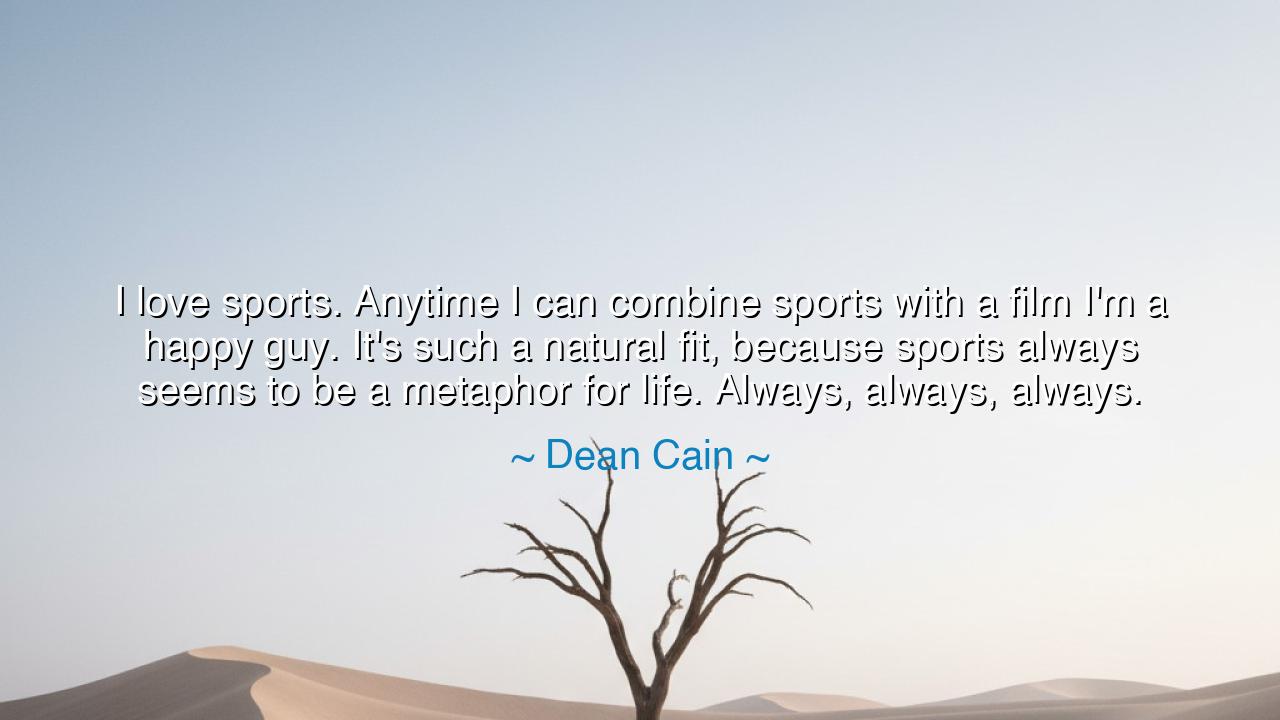
I love sports. Anytime I can combine sports with a film I'm a
I love sports. Anytime I can combine sports with a film I'm a happy guy. It's such a natural fit, because sports always seems to be a metaphor for life. Always, always, always.






The words of Dean Cain, “I love sports. Anytime I can combine sports with a film I’m a happy guy. It’s such a natural fit, because sports always seems to be a metaphor for life. Always, always, always,” are a hymn to the eternal link between the game and the soul. Here, Cain unveils a truth that men and women have known since the beginning: that the struggle of the athlete upon the field is not confined to the scoreboard, but is a mirror of the struggle of humanity itself. Victory, defeat, perseverance, discipline, teamwork—these are not confined to the gymnasium or the stadium, but belong to the whole journey of life.
The origin of these words springs from Cain’s own path. Before he wore the mantle of an actor, he was a man of the gridiron, a player of football whose career was shaped by both triumph and injury. When he turned to film, he did not abandon the lessons of sport, but carried them into storytelling. To him, the camera was but another field, and the tale of sport another way to tell the story of humanity. Thus, he spoke as one who had lived on both sides—the athlete and the artist—and had seen that the truths of one realm were always reflected in the other.
The ancients knew this well. In Homer’s Iliad, we find the funeral games of Patroclus, where heroes race, wrestle, and hurl spears not for glory alone, but to embody courage, honor, and loyalty. The contests upon the plain of Troy became symbols of life itself—striving, suffering, and enduring. Later, in the Olympic Games of Greece, athletes competed not merely for laurel wreaths, but as representatives of their cities, their gods, their families. Their bodies became living metaphors of struggle and endurance. In this way, Dean Cain’s words echo thousands of years of wisdom: that sport is never just sport.
Consider the tale of Jackie Robinson, who broke the color barrier in Major League Baseball. His story was not about hits or stolen bases alone—it was about resilience, dignity, and the unyielding spirit to endure hatred with grace. His life on the field became a metaphor for a larger battle: the struggle for justice, equality, and human dignity. Here we see that what Cain declares is no mere abstraction: in truth, every contest reflects a deeper human drama, and every field can become a stage upon which the lessons of life are enacted.
The lesson for us is plain: we must see in sport more than entertainment. We must see in it the shaping of character, the forging of perseverance, the training of the heart to rise after defeat. Every pass, every swing, every sprint can remind us that life itself is a contest of endurance, where we fall and rise again. To watch or play sport with this awareness is to train our souls, not only our bodies.
Practically, this means approaching sport—whether as athlete or spectator—with reverence. Do not watch the game only for the score; watch it for the lessons it reveals: teamwork in the unselfish pass, courage in the injured player who fights on, humility in the victor who honors the defeated. And if you yourself play, remember that the habits you forge in practice—discipline, resilience, unity—are the very virtues you will need in the larger game of life.
So, beloved listener, let Dean Cain’s words be inscribed upon your heart: sports are a metaphor for life—always, always, always. Do not dismiss the field as trivial, nor the athlete as mere entertainer. See instead the eternal drama unfolding there, the same drama you live each day: the struggle, the fall, the rising again, the striving toward greatness. For in every contest, whether under stadium lights or in the quiet battles of your own heart, the lessons of sport shine forth as the eternal teaching of life itself.






AAdministratorAdministrator
Welcome, honored guests. Please leave a comment, we will respond soon